实用综合教程教案Unit2
新编实用英语综合教程2unit_2_教案

Unit TwoOnline Growth ContinuedTeaching ObjectiveIn "Talking Face to Face", learn how to give thanks and how to express regret.In "Being All Ears", practice listening comprehension to greet and introduce people with various relationships.In "Maintaining a Sharp Eye", master the key words and structures and learn the way foreign people greet each other, particularly the way Americans meet and greet each other, both in informal and formal situations by reading through passage I; learn and practice how to introduce oneself by reading through passage II.In "Trying Your Hand", become knowledgeable on how to write a business card and fill in a passport with one’s personal information; review the basic sentence structure. Teaching ProceduresSection I Talking Face to Face1.Warm- up:The patterns and expressions of Internet communication.Internet Phone (IP) 网络电话Internet paging 网上寻呼Internet chat 网上聊天computer dating service 电脑交友服务email address 电子邮件地址computer document 电脑文件Internet account 因特网账户User’s name 用户名domain name 域名AFAIK (As Far As I Know) 据我所知BF (Boy Friend) 男朋友FUQ (Frequently Unanswered Questions)经常无人回答的问题FYI (For Your Information) 仅供参考KISS (Keep It Simple, Stupid) 把它看简单些,傻瓜LOL (Laughing Out Loudly) 放声大笑PEM (Privacy Enhanced Mail) 保密邮件PMJI (Pardon My Jumping In) 请原谅我插入RIYP (Reply If You Please) 请答复ROTFL (Rolling On The Floor Laughing)捧腹大笑2. Practice the two dialogues in Follow the Samples3. Practice dialogues according to the given tasks4. ExercisesSection II Being All EarsSee the textbook.Section III Maintaining a Sharp EyePassage I Online Growth ContinuedText-related InformationWays for Internet Connection:There are several ways for Internet connection. One common way is dial-up connection. For dial-up connection, you need a computer, a modem, and a telephone line.ISP is the abbreviation of Internet Service Provider. It provides services for Internet users to get connected with the Internet. Before getting connected with the Internet, an Internet user must apply for an account and a password from an ISP. He or she should also get its dial-up number, the addresses of its domainname and of the mail server.Now you can turn on your computer, start the dial-up program and get connected with the Internet. Then you can use the browser to enjoy the world of Internet. You can also send or receive emails with the help of the emails.People can do a lot of things by browsing Internet, such as sharing information, transacting business and communicating with people across the globe.Text ExplanationPara.1In just five years,the World Wide Web has become a powerful new medium for sharing information, conducting business and communicating with people across the room or across the world.Language Points:1.Explanation of Difficult SentencesIn just five years,…Analysis:In just five years implies in the five years just past, and the main verb of the sentence usually takes present perfect tense. Across the room and across the world are given here to indicate the wide range of use of the Internet.Translation: 在仅仅5年的时间里,全球范围网已经成为一种新媒体,使人们能够从小到房间内大到全球范围分享信息、处理业务并相互流。
新编实用英语综合教程(第四版)Unit 2教案

江西外语外贸职业学院教案备课纸(2)江西外语外贸职业学院教案备课纸(3)主任审阅____________________ 授课教师____________________ 年月日年月日江西外语外贸职业学院教案备课纸(4)授课内容Unit 2Section I Talking Face to FaceThe topic of talking face to face area in this unit is to express thanks and give responses while exchanging gift-card and congratulation card. The focus is on the patterns that are appropriate for giving information concerning the various reasons and hoping to get the forgiveness from the other person.1. The students read the mini-talks after the teacher, and then try to recite them within five minutes in pairs.2. Ask the students to underline the useful expressions and perform the mini-talks in class.3. The students discuss in groups, summarizing the words, phrases and sentences frequently used according to the following topics with the help of the teacher. The students speak out the sentences under the guidance of the teacher, paying attention to the pronunciation and the intonation.1) sentences frequently used for expressing thanks:It was so generous of you to send me such a fine and beautiful gift.I don’t know how to express my thanks to you.I’m grateful for all the help and encouragement you’ve given me.2) Sentences frequently used for expressing congratulations:Congratulations on your recent promotion!Please accept my heartiest congratulations.江西外语外贸职业学院教案备课纸(3)主任审阅____________________ 授课教师____________________ 年月日年月日江西外语外贸职业学院教案备课纸(4)授课内容Unit 2Section Ⅱ Being All Ears1. Give the students a few minutes to read through the printed materials for each listening item.2. Listen to the material for the first time without referring to the book.3. Listen to the material for a second time, and ask the students to answer the following questions orally.1) What is the relationship between Andy and Donna?2) What happened to Donna? How does she feel now?3) Why does Donna show her thanks to Andy?4) Where does Andy get the flowers?5) Where does Donna keep the flowers?江西外语外贸职业学院教案备课纸(3)主任审阅____________________ 授课教师____________________ 年月日年月日江西外语外贸职业学院教案备课纸(4)授课内容Section Ⅲ Trying Y our HandApplied WritingSample AnalysisThe teacher summarizes briefly the format and language used in thank-you notes, congratulation cards and apology letters. The teacher may show the following passage with PPT. Afterwards, ask the students to read it and translate it into Chinese orally. 1.More information about thank-you notes;Thank-you notes are usually exchanged between friends and acquaintances. They are brief, direct and often in an informal style. They are often written in simple languages, using courteous words and sentences to express the writer’s good wish or thanks. The following sentences are often used in thank-you notes.2.More information about congratulation cards:People often write and send a congratulation card to congratulate one on such joyful occasions as celebrating one’s promotion, wedding, birthday, graduation, etc. Congratulation cards are also exchanged on holidays. The language used in a congratulation card usually sounds courteous and complimentary. The following expressions and sentences often appear in congratulation cards.Grammar3.Assignment for this sectionWritten work: suppose you missed an appointment with your friend. Please write a letter of apology for his/her forgiveness.江西外语外贸职业学院教案备课纸(3)主任审阅____________________ 授课教师____________________ 年月日年月日江西外语外贸职业学院教案备课纸(4)授课内容Unit 2Section Ⅳ(1): Passage 1 Thank you, Volunteers!rmation Traditional Festivals in China.春节:Spring Festival ( the 1st day of the 1st lunar month)除夕:New Year’s Eve ( the day before the Spring Festival)元宵节:Lantern Festival ( the 15th of the 1st lunar month)清明节:Qingming/Tomb-Sweeping Festival (April 4th or 5th)端午节:Dragon Boat Festival( the 5the of the 5th lunar month)七夕节:Qixi Festival( the 7th day of the 7the month of the lunar month, somewhat equivalent to Valentine’s Day in English)中秋节:Mid-Autumn Festival( the 15th of the 8th lunar month)重阳节:Double-Ninth Day ( the 9th of the 9th lunar month)2.Important Traditional Festivals in Western Countries.圣诞节:Christmas( the 25th of December)平安夜: Christmas Eve ( the 24th of December)情人节:Valentine’s Day ( 14th of February)愚人节:Fool’s Day ( the 1st of April)复活节:Easter( the 1st Sunday after a full moon on or after 21st of Marth)感恩节:Thanksgiving Day ( the 4th Thursday f November)万圣节:Halloween/All Saints’ Day (31st of October)Important words1.offerv. make available or accessible, provide or furnishe.g. The conference center offers a health spa.The local student offers to guide us around the city.2. invitev. ask someone in a friendly way to do somethinge.g. Shall we invite the famous football player to join our club?Students are invited to submit papers to this online magazine.3. gratefula. feeling or showing thankse.g. He felt so grateful to all the strangers’ help.We need to feel more grateful for what we have instead of complaining what we don’t.4.breakn. a pause from doing something ( as work)e.g. The meeting was too long, so we had a tea break.A 10-minute break between each session offers us a time to rest a bit.5. appreciatev. be fully aware of;; realize fullye.g. Do you appreciate the full meaning of this letter?I do appreciate what you have done to ease my pain.6. recognizev. show approval or appreciation ofe.g. Our effort is fully recognized by the society.The in-service training center is widely recognized here.江西外语外贸职业学院教案备课纸(3)主任审阅____________________ 授课教师____________________ 年月日年月日江西外语外贸职业学院教案备课纸(4)授课内容Unit 2Section Ⅳ(2): Passage 1 Thank you, Volunteers!Language pointsExplanation of Difficult Sentences1. (Para. 1)November in the United States brings the holiday of Thanksgiving, and therefore it’s in November that we tend to think of a way in which we could show our thanks to volunteers.Analysis: This is a complex sentence. The basic sentence structure is S(subject) and S in which…In the second and-clause an emphatic structure it’s inNovember is used to emphasize the time adverbial of in November,modifying we tend to think. Which leads a relative clause, modifyinga way.Translation: 因此,我们在十一月里常常会想办法来表示对志愿者们的感谢。
实用综合教程教案(Unit1-2)
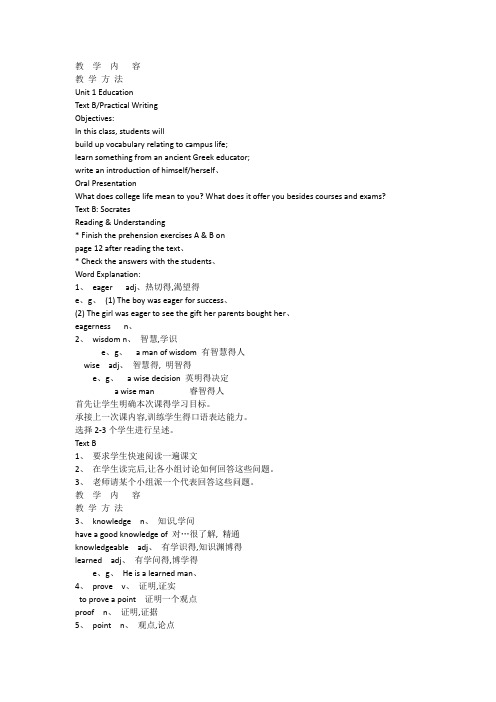
教学内容教学方法Unit 1 EducationText B/Practical WritingObjectives:In this class, students willbuild up vocabulary relating to campus life;learn something from an ancient Greek educator;write an introduction of himself/herself、Oral PresentationWhat does college life mean to you? What does it offer you besides courses and exams? Text B: SocratesReading & Understanding* Finish the prehension exercises A & B onpage 12 after reading the text、* Check the answers with the students、Word Explanation:1、eager adj、热切得,渴望得e、g、(1) The boy was eager for success、(2) The girl was eager to see the gift her parents bought her、eagerness n、2、wisdom n、智慧,学识e、g、 a man of wisdom 有智慧得人wise adj、智慧得, 明智得e、g、 a wise decision 英明得决定a wise man 睿智得人首先让学生明确本次课得学习目标。
承接上一次课内容,训练学生得口语表达能力。
选择2-3个学生进行呈述。
Text B1、要求学生快速阅读一遍课文2、在学生读完后,让各小组讨论如何回答这些问题。
实用英语综合教程1教案unit2
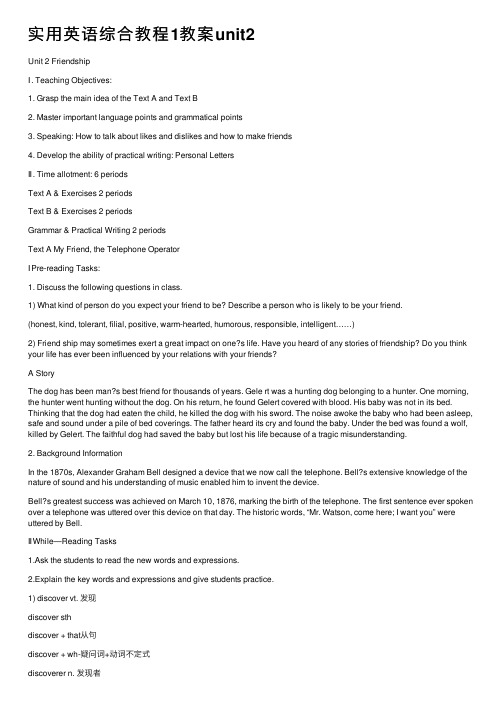
实⽤英语综合教程1教案unit2Unit 2 FriendshipⅠ. Teaching Objectives:1. Grasp the main idea of the Text A and Text B2. Master important language points and grammatical points3. Speaking: How to talk about likes and dislikes and how to make friends4. Develop the ability of practical writing: Personal LettersⅡ. Time allotment: 6 periodsText A & Exercises 2 periodsText B & Exercises 2 periodsGrammar & Practical Writing 2 periodsText A My Friend, the Telephone OperatorⅠPre-reading Tasks:1. Discuss the following questions in class.1) What kind of person do you expect your friend to be? Describe a person who is likely to be your friend.(honest, kind, tolerant, filial, positive, warm-hearted, humorous, responsible, intelligent……)2) Friend ship may sometimes exert a great impact on one?s life. Have you heard of any stories of friendship? Do you think your life has ever been influenced by your relations with your friends?A StoryThe dog has been man?s best friend for thousands of years. Gele rt was a hunting dog belonging to a hunter. One morning, the hunter went hunting without the dog. On his return, he found Gelert covered with blood. His baby was not in its bed. Thinking that the dog had eaten the child, he killed the dog with his sword. The noise awoke the baby who had been asleep, safe and sound under a pile of bed coverings. The father heard its cry and found the baby. Under the bed was found a wolf, killed by Gelert. The faithful dog had saved the baby but lost his life because of a tragic misunderstanding.2. Background InformationIn the 1870s, Alexander Graham Bell designed a device that we now call the telephone. Bell?s extensive knowledge of the nature of sound and his understanding of music enabled him to invent the device.Bell?s greatest success was achieved on March 10, 1876, marking the birth of the telephone. The first sentence ever spoken over a telephone was uttered over this device on that day. The historic words, “Mr. Watson, come here; I want you” were uttered by Bell.ⅡWhile—Reading Tasks1.Ask the students to read the new words and expressions.2.Explain the key words and expressions and give students practice.1) discover vt. 发现discover sthdiscover + that从句discover + wh-疑问词+动词不定式discoverer n. 发现者discovery n. 发现discover & learn两个词都含有“获得知识,了解”这个含义。
【免费下载】实用综合教程教案Unit2

Background information
(10 min)
Environment protection is an important issue for people all over the world. Making our living environment beautiful and comfortable depends on our care and attention. People are concerned with the pollution of air, water, food, etc., while noise has great impact on us, too. It affects people’s daily lives and health. Measures have been taken to reduce the noise around us. While enjoying the benefits of modern technology, mankind is also playing a high price. One example is the plastic bag, which has brought great convenience to people but has also done huge environmental damage. “White pollution” results from a combination of factors, including China’s fast consumption patterns. Promoting people’s environmental consciousness should be give importance. The more they know about how severe “white pollution” is, the more voluntarily they will help address the problem.
实用综合教程第二版unit2-电子教案-
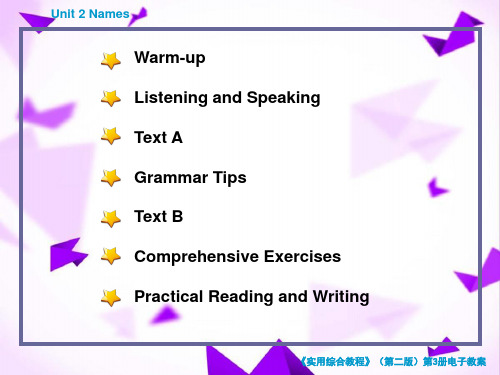
may be called Tim, or Jennifer may be called Jenny.
More examples:
Christopher — Chris Edward — Ed Andrew — Andy
Anthony — Tony
Richard — Dick William — Bill
Discussion
Title + surname
Neutral relationship / situation
Informal situation / Close relationship
Given name or title+ surname
Given name
Apart from the very formal or informal situations, on the whole, it is probably safer to use the “title + surname”; if people prefer to be addressed by their given name, they will usually say so.
● formal relationship/situation ● informal situation/close relationship ● neutral relationship/situation The relationship between the type of situation and the way in which a person is addressed in English can be summarized as follows:
实用英语综合教程第2册教案
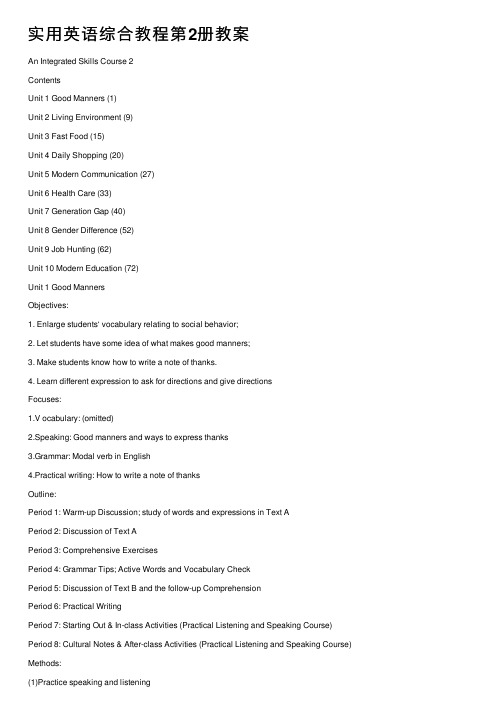
实⽤英语综合教程第2册教案An Integrated Skills Course 2ContentsUnit 1 Good Manners (1)Unit 2 Living Environment (9)Unit 3 Fast Food (15)Unit 4 Daily Shopping (20)Unit 5 Modern Communication (27)Unit 6 Health Care (33)Unit 7 Generation Gap (40)Unit 8 Gender Difference (52)Unit 9 Job Hunting (62)Unit 10 Modern Education (72)Unit 1 Good MannersObjectives:1. Enlarge students‘ vocabulary relating to social behavior;2. Let students have some idea of what makes good manners;3. Make students know how to write a note of thanks.4. Learn different expression to ask for directions and give directionsFocuses:1.V ocabulary: (omitted)2.Speaking: Good manners and ways to express thanks3.Grammar: Modal verb in English4.Practical writing: How to write a note of thanksOutline:Period 1: Warm-up Discussion; study of words and expressions in Text APeriod 2: Discussion of Text APeriod 3: Comprehensive ExercisesPeriod 4: Grammar Tips; Active Words and Vocabulary CheckPeriod 5: Discussion of Text B and the follow-up ComprehensionPeriod 6: Practical WritingPeriod 7: Starting Out & In-class Activities (Practical Listening and Speaking Course) Period 8: Cultural Notes & After-class Activities (Practical Listening and Speaking Course) Methods:(1)Practice speaking and listening(2)Discussion(3)Presentation and role play(4) ExercisesTeaching ProceduresPeriod 1:Step 1. Warm-up Discussion (5 minutes)Ask the students to talk about manners and why good manners are important in our life.Question:Do you think good manners are important in our life? Why?Hint: Good manners are important because (1) they help us make friends; (2) they show that we are well-educated; (3) they help to get things done.Step 2. Background Information (10 minutes)Tell something about Cultural differences between Chinese and Americans.Step 3. Vocabulary in Text A (20 minutes)Ask Ss to read new words and expressions by themselves and then read the new words together. Explain the important points.1. old-fashioned adj.过时的,⽼式的,守旧的Phrase: (1) out of fashion 过时(2) in fashion 时尚的,流⾏的e.g. Is it the fashion to wear short skirts? Yes, short skirts are in fashion.2. courtesy n.礼貌,谦恭;许可courteous 有礼貌的,谦恭的e.g. It was courteous of him to offer to help the old lady cross the street.Antonym: discourtesySynonym: politeness3. historically adv.在历史上,从历史⾓度看historical 历史上的,有关历史的historical lessons 历史教训historic 有历史意义的,历史上有名的 a historic meeting 历史性会议historian 历史学家,从事历史研究的⼈4. respect n.尊敬,敬佩;⽅⾯vt.尊敬respectful adj.恭敬的,尊敬的,有礼貌的respectable adj.可敬的,值得尊敬的respective adj.分别的,各⾃的5. concern vt.涉及,牵涉;使担⼼n.关⼼,担⼼;关⼼的事Phrase: (1) as / so far as…is concerned就……⽽⾔(2) (be) concerned about 关⼼,操⼼(3) (be) concerned with 有关,涉及concerning prep.关于,涉及e.g. There was a heated discussion concerning the value of the book.concerned adj.关切的,焦虑的;相关的,牵涉到的e.g. Everyone was concerned about your health.6. sense n. 感觉,官能Phrase: (1) come to one‘s sense 恢复理智;醒悟过来;苏醒过来(2) in a sense 从某种意义上说(3) make sense 讲得通,有意义(4) make sense of 理解,弄懂7. tough adj.凶悍的,粗暴的;艰苦的;坚韧的e.g. (1) a tough winter⼀个严冬(2) the toughest questions最困难的问题toughness n.韧性,坚韧;凶悍,粗暴8. mercy n.怜悯,宽恕,仁慈merciful adj. 仁慈的,慈悲的merciless adj. 毫⽆同情⼼的,冷酷⽆情的Phrase: at the mercy of 任由……摆布,完全受……⽀配e.g. They were lost at sea, at the mercy of wind and weather.9. be supposed to 应该e.g. We are not supposed to play football on Sundays.10. come up 发⽣e.g. The question never came up.Step 4. Vocabulary Check B &C (10 minutes)Ask the students to finish the exercise, vocabulary check (part B and C). Then check the answers.Period 2:Step 1. Language Points in Text A (30 minutes)Explain the language points to Ss and analyze the structure of the passage. Pay more attention to longer sentences in Text A and try to make Ss understand.1. One of the good things for men in women?s liberation is that men no longer have to pay women the old-fashioned courtesies:One way that men benefit from women‘s liberation is that they no longer need to be polite to women in the old ways, since the old rules of politeness are no longer popular.pay sb. courtesy: be polite to sb.2. According to an article on the changes on manners, a perfectly able woman no longer has to act helplessly in public as if she were a modal: Based on an article about changes in manners, a fully able woman does not have to behave in public as she were unable to take care of herself. as if / as though: introducing a subjunctive clausee.g. (1) He behaved as if nothing had happened(2) It seemed as though the meeting would never end.3. A man should walk where he wants to. So should a woman: A man should walk where he wants to walk; and a woman should also walk where she wants to walk.So: When it is put at the beginning of the sentence, the sentence should be inverted. So cannot be used with negation. We use neither.e.g. (1) Time have changed and so have we.(2) He prefers the first version. So do I.Comparison:So: used to agree that sth. is true, especially when you are surprised.e.g. There‘s yet another doll inside. —So there is.4. Over the years, out of sense of respect, I imagine, I have refused to trouble women with outdated courtesies: I think I have been consciously avoiding treating women with old-fashioned courtesies all these years, simply because I respect them.I imagine: This is a parenthetical remark (插⼊语), often inserted in the middle or at the end of the sen tence. Other similar expressions include ―I think (suppose, hope, guess, believe, wonder)‖, ―I tell you‖, ―I‘m afraid‖, ―I‘m sure‖, ―you see‖,―you know‖, ―that is‖, etc.trouble… with: This structure is often used in polite requests.e.g. I don‘t want to trouble the doctor with such a small problem.5. It is usually easier to follow rules of social behavior than to depend on one?s own taste: Just following rules of social behavior is often easier than acting according to one‘s own preference. follow a rule: keep or observe a rulee.g. How can the US government force others to follow rules while it doesn‘t always follow then itself?6. This is a courtesy I insist on as the stronger sex, out of love and respect: As a man, I always believe that men should treat women with this kind of politeness, because this shows love and respect for them.the stronger sex:This refers to men. For women, some people used to call them ―the weaker sex‖, ―the fairer sex‖, or ―the soft sex‖, which are now outdated.7. In times like these, there might be tough attackers hidden about.―Hidden about‖ is a past participle phrase used as an attribute to modify ―attackers‖. We can also say ―attackers who were hidden about‖.Step 2. Comprehension of Text A (15 minutes)Give students 5 minutes to go through the text, ask them to finish the exercise then check the answers.Period 3:Step 1. Comprehensive Exercises (45 minutes)Ask the students to finish the exercise then check the answers.Period 4:Step 1. Active words (20 minutes)Ask the students to pay more attention to the function of the active words and then finish the relative exercises.Step 2. Grammar Tips情态动词( Modal Verbs) (20 minutes)First, ask Ss to preview the explanation and then give further study of the grammar tip. Do theexercises to check out whether Ss know the grammar well.情态动词的定义情态动词有⼀定的词义,表⽰说话⼈的情绪、态度或语⽓,不能单独作谓语,只能和其他动词原形构成谓语。
新编实用英语综合教程2-Unit2CommunicationbyEmail教案设计
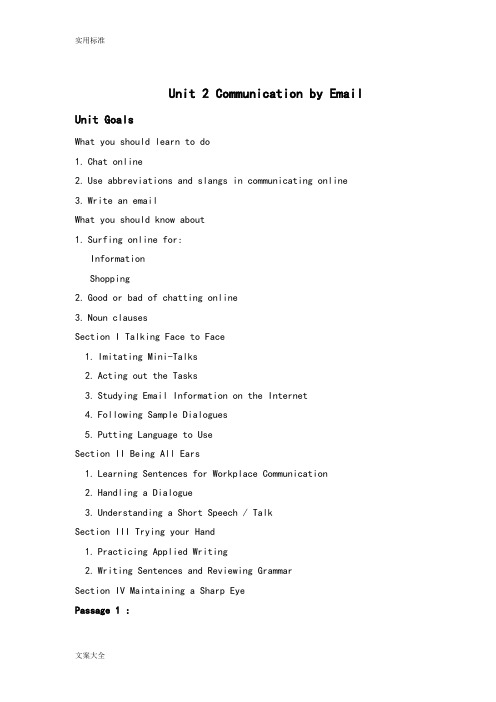
Unit 2 Communication by Email Unit GoalsWhat you should learn to do1.Chat onlinee abbreviations and slangs in communicating online3.Write an emailWhat you should know about1.Surfing online for:InformationShopping2.Good or bad of chatting online3.Noun clausesSection I Talking Face to Face1.Imitating Mini-Talks2.Acting out the Tasks3.Studying Email Information on the Internet4.Following Sample Dialogues5.Putting Language to UseSection II Being All Ears1.Learning Sentences for Workplace Communication2.Handling a Dialogue3.Understanding a Short Speech / TalkSection III Trying your Hand1.Practicing Applied Writing2.Writing Sentences and Reviewing GrammarSection IV Maintaining a Sharp EyePassage 1 :Information Related to the Reading PassageIt’s no understatement to say that e-mail has had a profound effect on our professional and personal lives. People thousands of miles away from each other can send and receive detailed documents within mere seconds. This allows us to take on projects that wouldn’t have been practical or possible only a few years ago. It has become routine for us to correspond and exchange files with people overseas. The only obstacle is the difference in time zones.But on the other hand, e-mail can eat up a substantial portion of our workday. Most of the time and effort involved is going through unsolicited messages and separating the good from the bad. But not all unsolicited messages are spam.Text E-mail, a Blessing and AnnoyanceFor the blessing:E-mail is a conversation that does not require an immediate response (like a telephone). If someone calls you on the telephone, you pick it up (unless you have an answering machine, voice mail or you are just plain rude) and the conversation begins. This is an interactive conversation. With e-mail, you send a message and then wait for a response. The response may come in five minutes or it may come in five days. Either way, it’s not an interactive conversation.If a hundred people send you e-mails in one day, so what? You don’t have to talk with all one hundred. Just think of all the hellos, goodbyes and other unnecessary chit-chat you can avoid. With e-mail, you only deal with their messages (which usually omit hellos, goodbyes and such) and you deal with them on your own time. That’s the blessing.Now for the annoyance:Too many e-mail users assume that the minute someone receives ane-mail, the person will read it. Bad assumption.If you schedule a meeting for an hour from now and send an e-mail to each participant, the chance that all the participants will read that message within the hour will be pretty small. On the other hand, if you schedule the meeting for the next day, the chance that they will read the message will be pretty high. Remember, e-mail is not designed for immediate response (that’s why you have a telephone), it’s designed for convenience.Some (not all) e-mail systems have features that try to combat this problem. These features (usually called “notification”) will notify you when a person has received your e-mail and may also tell you when the person has read it (really all it can do is assure you that the person has looked at the first screen of the message — it has no way to know if the person has read the message word for word). Referring back to the example in the previous paragraph, you could check to see who has checked their e-mail before the meeting and then telephone those who have not read it.Attachment: SmiliesSince there are no facial and voice cues to help e-mail, users have come up with something called “smilies”. They are simple series of symbols that are pieced together in the e-mail text to help express the writer’s feelings. The most common example is :-) (a smiling face). Here are some more examples.They are typically found at the end of sentences and will usually refer back to the previous statement.Language Points1 Explanation of Difficult Sentences1. (Para. 3) If a hundred people send you e-mail in one day, so what?Analysis: so what? is an informal expression, which means “ Why should I care?”Translation: 如果在一天内有一百个人给你发邮件,那又怎么样呢?2. (Para. 3) Just think of all the hellos, good-byes and other unnecessary chit-chat you could avoid.Analysis: Just is used to make a statement or command stronger, meaning in Chinese “只是,仅仅”。
- 1、下载文档前请自行甄别文档内容的完整性,平台不提供额外的编辑、内容补充、找答案等附加服务。
- 2、"仅部分预览"的文档,不可在线预览部分如存在完整性等问题,可反馈申请退款(可完整预览的文档不适用该条件!)。
- 3、如文档侵犯您的权益,请联系客服反馈,我们会尽快为您处理(人工客服工作时间:9:00-18:30)。
课时教案授课章节及题目Unit 2 Our Living Environment 授课时间第3周课次6学时12教学目标与要求1. Enlarge the students’ vocabulary relating to living environment2. Improve students’ speaking ability through class discussion3. Make students know the importance of environmental protection教学重点与难点1. The usage of words and expressions2. Grammar: The adverbial clause of time3. Writing: writing a note of apology4. Listening: pay attention to the listening skills and contents.教学用具教科书,讲义,教案,PPT,黑板,粉笔教学过程环节、时间授课内容教学方法Lead-in (20 min)Warm-up Discussion:1. What suggestions do you have forenvironmental protection?Hint: The environment can be protected if(1) people understand the importance ofenvironmental protection(2) everyone makes his or her ownsurroundings clean(3) we create a beautiful environment forpeople to protect.2. Do you know any pollution nowadays? Whatare the reasons?(1) Noise pollution(2) Air pollution(3) Light pollution(4) Water pollution3. What can college students do to contribute toa beautiful and comfortable livingenvironment?DiscussionBackground information (10 min)Environment protection is an important issuefor people all over the world. Making our livingenvironment beautiful and comfortable dependson our care and attention.People are concerned with the pollution of air,water, food, etc., while noise has great impacton us, too. It affects people’s daily lives andhealth. Measures have been taken to reduce thenoise around us.While enjoying the benefits of moderntechnology, mankind is also playing a highprice. One example is the plastic bag, which hasbrought great convenience to people but hasalso done huge environmental damage.“White pollution” results from a combination offactors, including China’s fast consumptionpatterns. Promoting people’s environmentalconsciousness should be give importance. Themore they know about how severe “whitepollution” is, the more voluntarily they willhelp address the problem.ExplanationStudy of words and expressions in Text A(50min)Vocabulary:1.accident n. 事故,意外,偶发事件Phrase: by accident 偶然2.trip n.旅行,航行e.g. 1) make a trip 进行旅行2)go on/ take a trip去旅游Synonym: journey n. 旅行,旅程3.step v. 走,踩,踏入n. 步子,步伐Phrase:step by step 按部就班地4.reproduction n. 再现,复制;繁殖e.g. reproduction furniture 仿制家具reproduce v. 再生产,复制,繁殖reproductive adj. 再生产的5.decorate vt. 装饰,装修e.g. Their house is decorated in the Frenchstyle.他们的房子装潢是法国式的。
Decoration n.Decorative adj.6.sticky adj. 粘的,粘腻的e.g. The tape is not very sticky.这个胶带不是很粘。
Stick v. 粘住,坚持,困住,使为难7.stuff n. 材料v.填充,塞满,塞住ExplanationDiscussionTranslatione.g. 1) green / garden stuff 蔬菜2)sweet stuff 糖果,糕点3)He stuffed his fingers into his ears. 他拿手指塞住耳朵。
8. considerate adj. 考虑周到的,体谅的e.g. It was very considerate of you to let us know you were going to be late.你告知我们你会迟一点真是太周到了。
Antonym: inconsiderate adj. 不体谅的Consideration n. 考虑;照顾8.license n. 执照,特许证vt. 批准,许可,发许可证e.g. 1)license fee 牌照费2)a license to practice medicine 行医执照3)apply for a driving license 申请驾驶执照4)grant a marriage license 颁发结婚证书5)license sb. to practice as a doctor 批准某人做开业医生Licensed adj. 得到许可的,领有执照的Licensee n. 被许可的人,领有执照的人Licenser n. 认可者,发许可证的人9.reserve vt. 保留;预定,预约;储备e.g. A great future is reserved for you. 远大的前程等着你。
Reservation n.Make a reservation订座,订房间10.rarity n. 稀有,稀少rare adj. 稀有的,罕见的;稀少的e.g. 1) rare metal 稀有金属2)in rare cases/ on rare occasions 难得,偶尔3)It’s very rare for her to miss a day of school. 她一天不上课是很少见的。
11. respond vi. 回答,响应,作出反应e.g. Mike responded to my suggestions with a laugh. 迈克对我提出的建议报以一笑。
Response n.Responsive adj. 有响应的,反应灵敏的Language points:by accident 碰巧,偶然 e.g. I met my best friend in Nanjing quite by accident.make a trip to 到某处去 e.g. He made a trip to Hangzhou to visit his colleague.make sure 确保,确信 e.g. I made sure that the front door was locked.in order 整齐,情况良好 e.g. Please put everything in your dormitory in order.put up 张贴 e.g. The exam results will be put up on Friday afternoon.hit on 偶然发现 e.g. I have hit on the only error in the whole program.add to 增添,增加 e. g. I gave him a rare Swedish stamp to add to his collection.The moment I stepped into the cab, I realized it was differentthe moment that sb. does sth.: as soon as sb. does sth. e.g. I will tell him the moment he comes in.Review the new words and expressions, then do the exercises, vocabulary check (part C),page 25.Key: 1. instructions 2. accidentally 3. rarity 4. response 5. reservation 6. spotless inclination 8. decorationGrammar tips and Summary(10 min)时间状语从句(The Adverbial Clause of Time)在英语中,时间状语从句表示时间。
